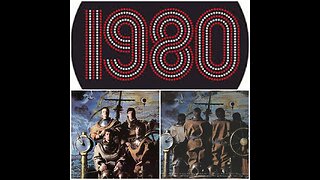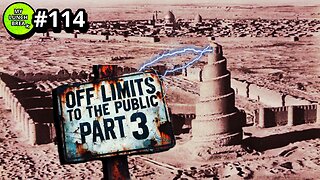Premium Only Content

Song For The day July 4th 2024
On American Independance Day my song is by Prefab Sprout from their second album Steve mcQueen relesed in 1985 - Song When Love Breaks Down
Album Review
Steve McQueen (Deluxe Edition)
Kitchenware; 1985/2007
By Stephen Trouss; August 29, 2007
8.6
Tracklist
1 Faron Young 2 Bonny 3 Appetite 4 When Love Breaks down 5 Goodbye Lucille #
6 Hallelujah 7 Moving The river 8 Horsin’ Round 9 Desire As 10 Bluebery Pies 11When The Angels
In another time, in another place, Paddy McAloon might have been happily productive somewhere between the Algonquin and Broadway in 1930s New York ("I want to be," he once crooned, hopefully, "the Fred Astaire of words.") Or beavering away in an office in the Brill Building in the 50s. Or maybe some place on that off-kilter middle of the road between Burt Bacharach and Jimmy Webb in the 60s. Almost anywhere, you might have thought, other than Britain in the mid-80s.
Some hard-hearted professors of pop would have it that 1985 was the absolute nadir of British music: all the fizz of new pop gone flat, the independent scene a twee shambles. Yet in records such as the Blue Nile's A Walk Across The Rooftops, the Pet Shop Boys' Please, Kate Bush's Hounds of Love, Scritti's Cupid and Psyche 85, and especially in Prefab Sprout's Steve McQueen, you have some of the most beautiful, enduring British pop music ever made. For a year or two, just before Live Aid and Q magazine, the challenge of making new pop for grown-ups without being dowdy, smug, or jaded was met, quite superbly. It's this guile and grace that bands like Stars and Junior Boys still yearn for.
The Sprout-- it's ironic that a writer so fleet-footed lumbered himself with such a clunking band name-- had debuted in 1984 with Swoon, a record that suggested they were post-graduates of the Glasgow School, taking the Postcard label template to new levels of cryptic wit and elliptical jangle. But as McAloon made plain, his ambitions were far grander. He aspired to the standards of Stephen Foster, Gershwin, Sondheim, Quincy Jones, McCartney; saw himself as a contemporary of Prince rather than Lloyd Cole. He had a grand sense of pop music, and in 1985, that kind of grandeur seemed to be available via producers like Thomas Dolby.
McAloon has said that Steve McQueen is Dolby's record-- he presented the producer with a vast archive of songs and asked him to choose his favorites. Yet this is true most obviously in the profoundly 80s sonic palette. Rather wonderfully and typically, it seems that Dolby even chose to play the banjo on the opening track, the country pastiche "Faron Young", via a Fairlight sampler. And the presence on this new reissue of an additional disc of acoustic versions of the songs-- which took longer to record than the original-- suggests that McAloon now feels embarrassed, as though the production has dated or even damaged his songs.
I think he needn't be so bashful; one of the defining qualities of the record is its pop ambition, its willingness to engage with its times, precisely by not being a sullen singer-songwriter would-be timeless classic. Imagine if Sinatra had decided that Nelson Riddle's arrangements tied his albums to closely to the early 50s. According to this additional disc, Steve McQueen might have been some perfectly prim and pleasant Go-Betweeny acoustic curio, rather than how it ended up: the kind of record you imagine Elvis Costello might have made had he been signed to ZTT and been ensconced in a studio with Trevor Horn.
One thing the new versions do highlight is the astonishing maturity of the songs. Coincidentally, almost all of Dolby choices dated from 1979, when Paddy was 22. Yet they sound all the more appropriate sung by a man of 50. "Life's not complete, 'til your heart's missed a beat," he sighed on "Goodbye Lucille #1", but now when he sings "and you'll never get it back," his voice breaks with the wisdom of another two decades.
Ironically, considering the producer's name, it's a record in so many ways about infidelity. Or let's say about the consequences of romanticism. Take that cover: Paddy, looking like a dreamy young D.H. Lawrence, astride the kind of Triumph that would have carried the record's namesake to freedom. But the whole album rails against easy escapism: "Appetite", sung from the perspective of a girl left to bring up the baby of some young firebrand; "Desire As" seeing no escape from a lifetime of new flames; the rueful regrets of "Bonny".
And maybe I'm too much a child of those times myself, but it still sounds great to me: the glittering guitar that opens "Goodbye Lucille", the 10cc/ZTT moments of "When Love Breaks Down". Even Wendy Smith's gaseous backing vocals, haunting the record like the ghost of Hayley Mills.
In fact it seems to me that instead of stripping back the songs from their 80s incarnations, the additional disc could have more profitably commissioned some original covers. McAloon was, after all, the original Stephin Merritt, so there's no reason why he shouldn't have his own Sixths. You can imagine these songs performed by, oh, Marianne Faithfull, Bryan Ferry, Will Young, Kylie Minogue, Rufus Wainwright, or Antony Hegarty. A handful of these songs have the quality of standards: there's no reason why their real after-life shouldn't begin now.
-
 10:20
10:20
JohnVicarysMusicPassions
17 days agoMy Top 20 albums 1980 No 7
461 -
 LIVE
LIVE
Vocalot
21 hours agoDay 6! New Here! New Rumble Friends!? 🤙
2,436 watching -
 34:27
34:27
The Connect: With Johnny Mitchell
15 hours ago $10.02 earnedCan He Stop Them? Inside Trumps War On Mexican Drug Cartels & The New Era Of Mexican Organized Crime
25.1K11 -
 2:33:15
2:33:15
Tundra Tactical
7 hours ago $8.11 earnedLuis Valdes Of GOA Joins The Worlds Okayest Firearms Live Stream!!!
27.4K -
 1:03:41
1:03:41
Man in America
16 hours agoAre Trump & Musk the COUNTER-ELITES? w/ Derrick Broze
69K38 -
 3:45:08
3:45:08
DLDAfterDark
7 hours ago $9.04 earnedDLD Live! SHTF Handguns! Which Would You Choose?
38.2K2 -
 1:50:38
1:50:38
Mally_Mouse
10 hours agoSaturday Shenanigans!! - Let's Play: Mario Party Jamboree
48.7K -
 1:13:00
1:13:00
Patriots With Grit
14 hours agoWill Americans Rise Up? | Jeff Calhoun
40K13 -
 14:55
14:55
Exploring With Nug
14 hours ago $10.99 earnedWe Found Semi Truck Containers While Searching for Missing Man!
56.7K7 -
 27:57
27:57
MYLUNCHBREAK CHANNEL PAGE
21 hours agoOff Limits to the Public - Pt 3
126K65